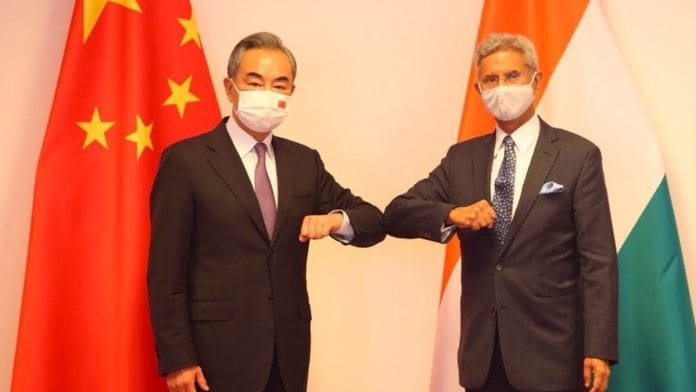New Delhi: External Affairs Minister S. Jaishankar met his Chinese counterpart and State Councilor Wang Yi Wednesday on the sidelines of a Shanghai Cooperation Organisation (SCO) meeting in Tajikistan, and told him that any unilateral change in status quo in the India-China border areas is “not acceptable”.
During an hour-long in-person meeting between the ministers, both sides discussed the ongoing border standoff along the Line of Actual Control (LAC) in eastern Ladakh.
“Concluded a one-hour bilateral meeting with State Councilor and FM Wang Yi of China on the sidelines of Dushanbe SCO Foreign Ministers Meeting. Discussions focused on the outstanding issues along the LAC in the Western Sector,” Jaishankar said in a tweet.
“Highlighted that unilateral change of status quo is not acceptable. Full restoration and maintenance of peace and tranquility in border areas is essential for the development of our ties,” he added.
Jaishankar said both ministers also agreed on convening an early meeting of senior military commanders.
Highlighted that unilateral change of status quo is not acceptable. Full restoration and maintenance of peace and tranquility in border areas is essential for development of our ties.
Agreed on convening an early meeting of the Senior Military Commanders.
— Dr. S. Jaishankar (@DrSJaishankar) July 14, 2021
Also read: Jaishankar meets Afghan counterpart in Dushanbe amid India’s security concerns in Afghanistan
Meeting after ‘Moscow agreement’
Jaishankar and Wang are currently in Tajikistan capital Dushanbe for the SCO foreign ministers’ meeting and the conference on SCO Contact Group on Afghanistan.
This was their first in-person meeting after September 2020 when they had gathered in Moscow for a similar SCO session.
During that meeting, India and China had come up with a so-called ‘Moscow Agreement’ under which a five-point agenda was agreed on easing tensions along the border that have now lasted for over a year.
The meeting had taken place in the aftermath of the clash in Ladakh’s Galwan valley on 15 June 2020, in which India lost 20 of its soldiers.
Need to follow through on agreement: MEA
In a statement issued after the Wednesday meeting, the Ministry of External Affairs (MEA) said: “Recalling their last meeting in Moscow, in September 2020, the External Affairs Minister emphasized the need to follow through on the agreement reached then and complete the disengagement, resolving the remaining issues along the LAC in Eastern Ladakh at the earliest.”
During the meeting, Jaishankar also pointed out to Wang that the successful disengagement in the Pangong Lake area earlier this year had “created conditions for resolving the remaining issues”, said the statement.
“It was expected that the Chinese side would work with us towards this objective. EAM noted however that the situation in the remaining areas is still unresolved. EAM recalled that both sides had agreed that a prolongation of the existing situation was not in the interest of either side. It was visibly impacting the relationship in a negative manner,” the MEA added.
Since the standoff began in May last year, India has maintained that the border skirmish has gone on so long this time because China has violated all existing border protocols. The MEA reiterated this in its statement Wednesday.
“There was also an understanding that both sides will continue to ensure stability on the ground and neither side will take any unilateral action that could increase tension. The two Ministers agreed to remain in touch,” the MEA added.
The last round of diplomatic-level talks on the issue of disengagement was held on 25 June under the framework of the Working Mechanism for Consultation and Coordination on India-China Border Affairs.
Meanwhile, the Army Wednesday denied media reports that a fresh clash broke out between India and China in Ladakh.
Also read: SCO must stop terror financing, combating terrorism its key purpose, says Jaishankar






